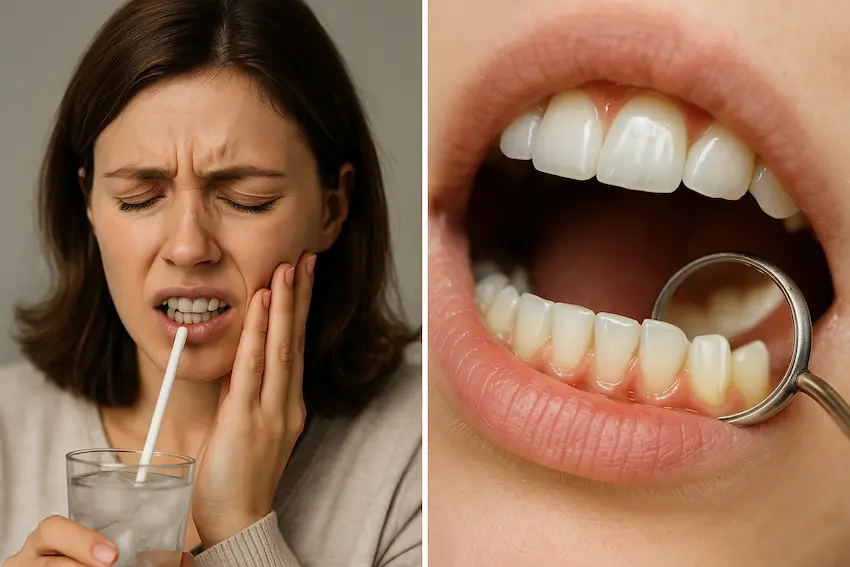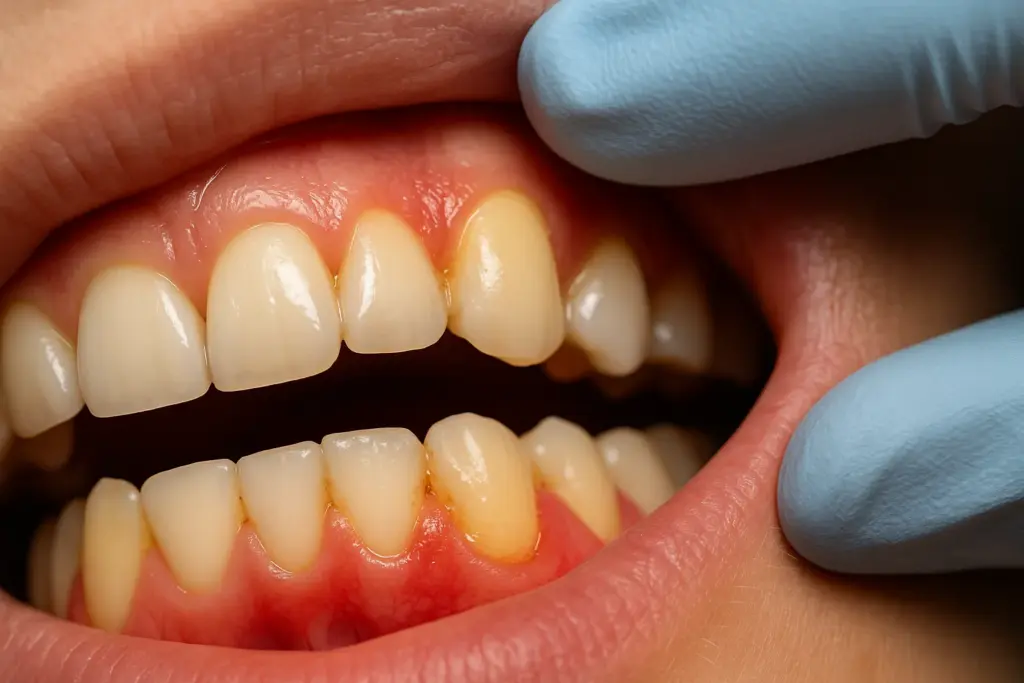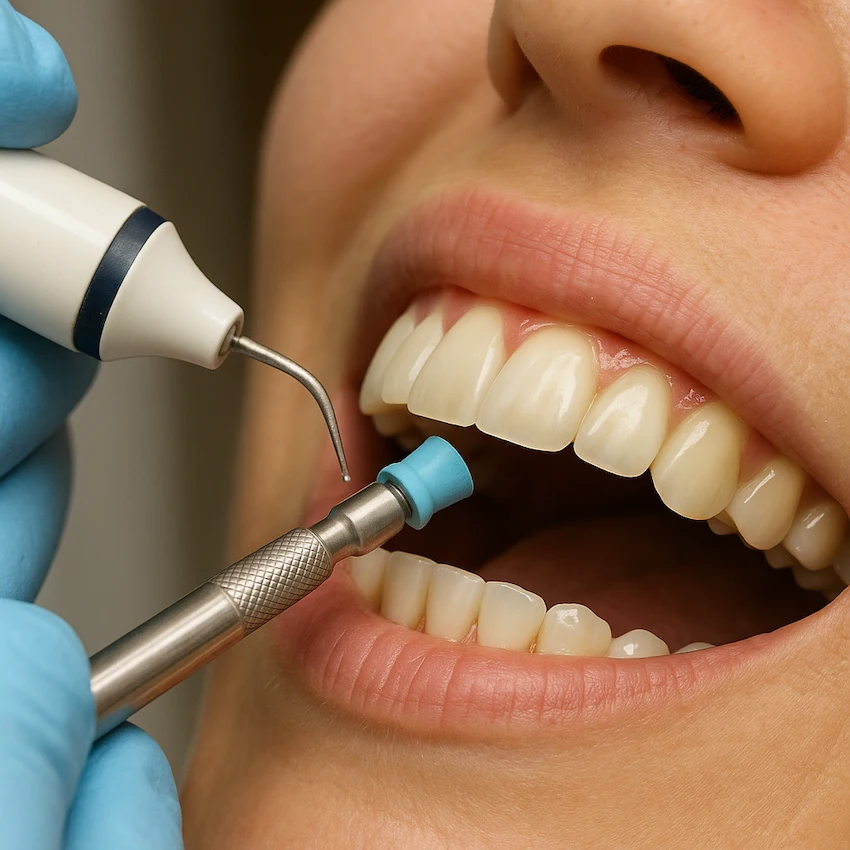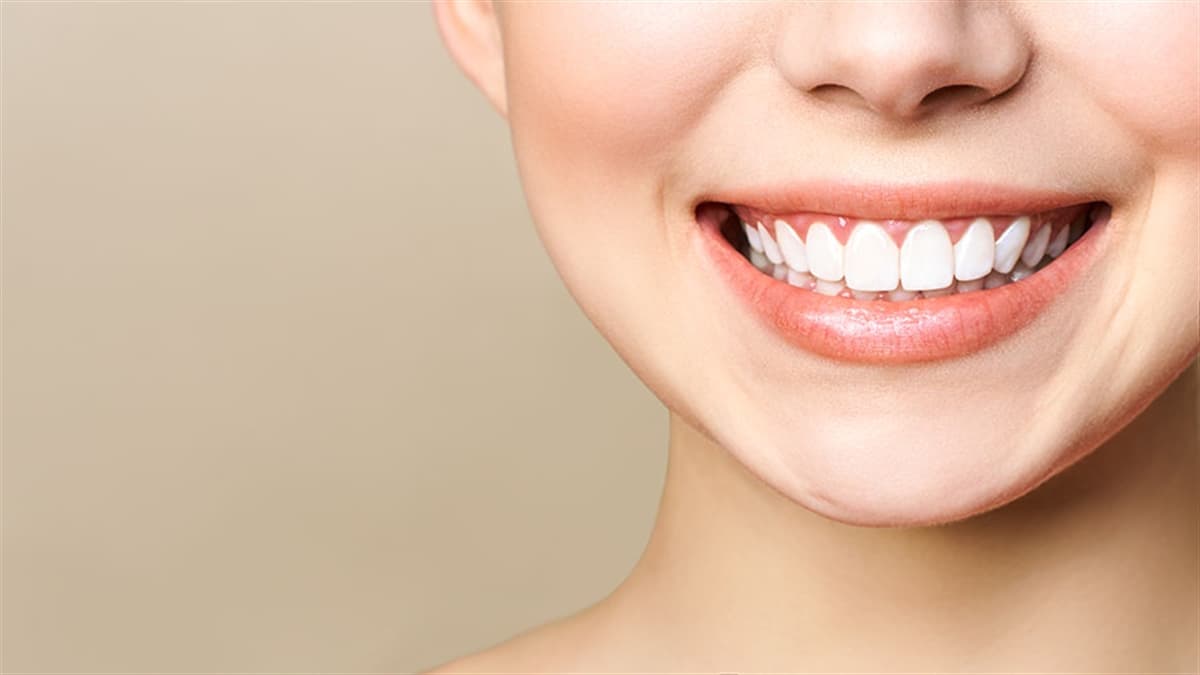🦷 Sensitive Teeth: Causes, Treatments, and Prevention
Let’s Talk About Tooth Sensitivity 😬
Tooth sensitivity is likely the cause if you have ever felt a sudden sharp pain or a tingling sensation in your teeth after sipping ice-cold water or enjoying a hot cup of coffee.
Tooth sensitivity (dentin hypersensitivity) is a frequent problem when teeth react to specific stimuli (cold, hot, or sweet foods). The pain can be episodic or constant and can affect either a single tooth or more than one.
But the main question is what causes tooth sensitivity and how we are able to cope with it? Let’s find out about the common causes, treatment, and prevention that will help us maintain our teeth in a healthy and pain-free state. 🦷✨
🧠 What Causes Sensitive Teeth?

To figure out the reason for the sensitivity in your teeth, we have to analyze the situation inside your teeth.
The teeth are composed of three layers:
- Enamel: The hard, protective outer layer.
- Dentin: The softer, middle layer.
- Pulp: The innermost part of the tooth with the nerves and blood vessels.
When enamel has been eroded or the gums receded, dentin is revealed which is full of tiny nerve endings. These nerves are very sensitive to temperature changes or pressure, and that is why you feel discomfort when eating or drinking something hot or cold.
Here are the explanations of some of the common causes of sensitive teeth:
1. 🦷 Worn-Down Enamel
Enamel is the most resistant material in your body, however, it can be gradually eroded by:
- Acidic foods and drinks (like soda, citrus fruits, wine, etc.) 🍋🥤
- Brushing with too much force and a toothbrush with hard bristles
- Grinding your teeth (bruxism) while you are sleeping 💤
With the thinning of enamel, the sensitive dentin located underneath gets exposed which results in pain and discomfort.
2. 😷 Gum Recession
Gum recession takes place when the gums withdraw from the tooth and the root gets uncovered. Receding gums are generally a result of:
- Gum disease (gingivitis or periodontitis) 🩸
- Overbrushing or brushing with a hard-bristled toothbrush 🧴
- Hereditary or normal aging
the root of the tooth once it is bare; it is susceptible to sensitivity, however, because the root is not covered by enamel which is the protective layer.
3. 🦷 Tooth Decay or Cavities

Tooth decay is one of the causes that make teeth sensitive. When the decay eventually goes through the enamel and reaches the dentin layer, it can only be explained by pain when eating hot, cold, or sour foods.
Lema Tip: If you have sensitive teeth as well as visible holes or dark spots, certainly, it is time for your dentist to examine your teeth for cavities.
4. 🦷 Dental Procedures
Some dental surgeries that can lead to temporary tooth sensitivity are:
- Teeth whitening treatments (especially if you have thin enamel)
- Fillings, crowns, or root canals that give easy access to the nerves
- Deep cleaning and root planing for gum disease
These treatments offer the possibility of temporary sensitivity but the discomfort should subside a short time after healing.
5. 🧴 Acidic Diet
A diet rich in acidic foods and drinks, such as:
- Citrus fruits 🍊
- Tomato-based sauces 🍝
- Energy drinks 🥤
These kinds of foods can erode the enamel, thus revealing the dentin layer of your teeth and causing tooth sensitivity. The acid makes the enamel softer, so as time goes on it’s easier for it to be gradually removed.
🦷 How to Treat Sensitive Teeth
If you are experiencing tooth sensitivity, the good news is that it is in most cases a treatable condition. Below are the most effective treatments to relieve and control sensitivity:
1. 🧴 Desensitizing Toothpaste
The use of desensitizing toothpaste is considered one of the major ways in which sensitive teeth can be cured. Such toothpaste usually consists of such ingredients as potassium nitrate or stannous fluoride, which give the effect of blocking the pain signals to the nerves which is the reason for the feeling of discomfort.
Method of application:
- Desensitizing toothpaste can be applied twice a day.
- Have some patience with it—probably it will be at least a few weeks before the full effect sets in.
Lema Tip: Should you have sensitive teeth, inquire among dentists about which desensitizing toothpaste will be best to alleviate your case.
2. 🦷 Fluoride Treatments
The dentist may include fluoride therapy in his prescription for the purpose of giving strength to the teeth’ enamel and to lessen sensitivity with time. Apart from a gel or varnish that can be used for instances when fluoride is to be taken topically, the dentist will also recommend a fluoride toothpaste for daily usage prepared by the patient.
Lema Tip: In addition to home use, physician-applicated fluoride treatments can act as a barrier for mid and long term-aid against dental sensitivity and caries.
3. 🦷 Dental Sealants
In case the root of your sensitivity lies in the carved or cracked parts of the teeth, protective plastic coverings called dental sealants may be of use in protecting the exposed areas. Sealants are thin layers of plastic that exclusively cover the chewing surfaces of your back teeth, thus not allowing plaque to accumulate and minimizing the possibility of sensitive areas being exposed to other hard substances.
4. 🦷 Root Canals
For extreme cases of sensitivity, if the pain is due to nerve damage or deep decay, a root canal might be suggested by your dentist. This operation removes the infected pulp (nerve) inside your tooth and then closes the tooth to prevent the pain or infection from continuing.
5. 🦷 Gum Grafting
When gum recession is the reason for your sensitivity, a gum graft may be required to both provide and protect the tissue around the teeth. The process is by taking some tissue from another part of your mouth and attaching it to the area where the gums have receded.
Lema Tip: In case of gum recession, gum grafting can be a remarkable option not only for the restoration of the function but also for the aesthetics of your smile.
🦷 How to Prevent Tooth Sensitivity

The best way to avoid sensitivity is by observing good oral hygiene and making a few adjustments in your lifestyle. The way is as follows:-
1. Brush Gently with a Soft-Bristled Toothbrush
Hard brushing can chip off the enamel and cause gum exposure, which might lead to sensitivity. Stick with a soft-bristle brush and use gentle, circular motions to clean your teeth without risking any kind of harm.
Lema Tip: Try not to overdo the brushing—it will be more effective if you do it in a gentle manner but thoroughly.
2. 🧵 Floss Regularly
Flossing allows plaque to be removed from the spaces between your teeth which is the main cause of tooth decay and gum disease. To protect your teeth and gums make sure you floss at least once a day.
3. 🍏 Eat a Balanced Diet
The calcium, vitamin D, and vitamin C-rich diet will keep your teeth strong and your gums healthy. Still, cut off the consumption of sugary and acidic foods and drinks which contribute both to the enamel loss and the development of the cavities.
4. 🦷 Avoid Teeth Grinding
Bruxism, or teeth grinding, may result in wearing down your enamel and leading to sensitivity. The use of a night guard to protect your teeth from grinding might be a good idea to consider.
5. 💧 Stay Hydrated
Water ingestion not only removes food debris from your mouth but also keeps it hydrated. Dry mouth can be the reason for your tooth decay and sensitivity, so drinking the right amount of water is crucial.
🏥 Why Choose Lema Dental Clinic for Tooth Sensitivity?
Lema Dental Clinic in Istanbul is a specialist in diagnosing and treating tooth sensitivity. Our team of dentists with long years of experience provides personalized treatment and can make you the happiest solution for your sensitive teeth. Below are some reasons why Lema is your best stop clinic for dealing with tooth sensitivity:
✔️ Comprehensive Diagnosis
With physical examinations and diagnostic tests, we help identify if the sensitivity to you is due to gum disease, enamel wear, or cavities, or any other reason.
✔️ Customized Treatment Plans
After we have identified the cause of your sensitivity, we will personalize a treatment plan to meet your needs, starting with desensitizing toothpaste, the application of fluoride, or even the necessary advanced procedures.
✔️ Advanced Technology and Techniques
We employ cutting-edge technology and the most advanced procedures to get the best results possible. The objective of our dental services is to be as efficient and pleasant as possible for you.
✔️ VIP Care and Multilingual Services
If you are either from Istanbul or coming to Lema for dental treatment, then let me tell you that Lema is a place where you will receive multilingual support and VIP care which will ensure that your journey is safe and comfortable.
💡 Final Thoughts: Don’t Let Sensitive Teeth Hold You Back
Dental sensitivity is not a big boss that needs to control your life. No matter what the case is with worn enamel, recession of gum, or decay of the tooth, there are numerous ways to treat and manage sensitive teeth.
In Lema Dental Clinic located in Istanbul, we are the experts in the diagnosis of the cause of your sensitivity and the provision of safe solutions to the relief of the pain and the restitution of the smile’s comfort. 🦷💙
Never permit tooth sensitivity that it will prevent you from tasting your favorite foods and drinks—make a consultation appointment now and let the first step toward a painless smile become yours!
Sensitivity occurs when the dentin (inner layer) of your tooth is exposed, often due to worn enamel or gum recession.
Desensitizing toothpaste, fluoride treatments, and custom dental appliances can help reduce tooth sensitivity.
Not necessarily. With proper treatment and oral care, sensitivity can be reduced or eliminated.
Yes, gum disease can cause gum recession, which exposes the sensitive parts of your teeth.
Use a soft-bristled toothbrush, floss daily, and avoid acidic or sugary foods to protect your enamel and gums.




